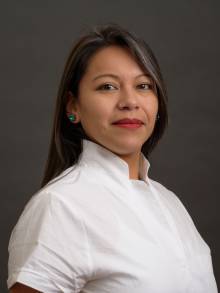Maria Ponce Sevilla
MPA in Public & Nonprofit Management & Policy
-
2022

What were you doing before you came to NYU Wagner?
I was working for a nonprofit in Mexico that was supporting Mexican deportees and returnees from the US, many of whom had left Mexico at a young age. We were helping them set up their lives in Mexico, for example how to obtain an ID or apply for a job. That experience was foundational for me. After that, I was working at NYU’s Silver School of Social Work as a grants administrator. Throughout that period, I volunteered and was a member of a mutual aid group, especially during the pandemic, just to be able to help people in some small way. In 2021, the Transnational Villages Network invited me to work part time with them on a new grant that they had received from NYC Department of Health to promote vaccine and health information in different languages, including indigenous languages. I started with five hours a week, because I was already working full time and studying at NYU Wagner part time from 2019 onwards. Those five hours soon grew into more, despite my best intentions to set boundaries. But there's something so beautiful about seeing tangible results and actual change. Which is why I made the decision to work for the organization full time and leave my more established role behind, despite the uncertainty of joining a small grassroots organization where a lot needs to be done to expand its programs and have it continue impacting the community the way it has so far.
Can you tell us a bit about your job responsibilities?
In March 2023, I became the inaugural executive director of the Transnational Villages Network, also known as Red de Pueblos Transnacionales. The organization is an umbrella for different grassroots collectives led by indigenous and rural immigrant groups living in New York City. It includes an indigenous interpreters collective representing over 10 indigenous languages, a School for Peace, Health and Justice, teaching ancestral traditions and knowledge, a women’s group focusing on gender justice, an advocacy group working with the Mexican Consulate, a news outlet for immigrants by immigrants, we also have arts, and cultural programming, as well as presentations on immigration, mental health and social work services. Each year, we bring families and organizations from across Latin America together for our New York Tlan festival, for a celebration of their projects. My daytoday is a little bit of everything. A lot of what I've been doing over the past six months is putting systems in place to make the organization sustainable: setting up human resources, formalizing hiring practices, creating an employee handbook, building Salesforce, and hiring our first full-time social worker. The first year, we decided that we're going to focus on institutionalizing a lot of the existing processes, in order to become more proactive and less reactive, it involves talking to our community members a lot. It’s important to listen to them, to get a feel for what's going on in their immediate environment and how that's going to play a larger role in our programming, and to figure out the ways we can best respond to what their needs are. Our community members are about 90% women, their children and occasionally their partners on their day off.
What impact do you hope to make through your career and/or organization?
I hope to be able to empower people, especially immigrant women, to encourage them to go out in spite of their limitations and have an impact in their communities. I grew up undocumented in New York City, I was able to accomplish many things because I had a community who believed in me and was supportive when I needed it. The biggest impact I could have on someone and on the organization itself would be to create a sustainable system of support for other people that can eventually multiply.
What might your next move be?
As an inaugural executive director, I think that five years might be ample time to create good systems and to pave the way for a successor to come in and help the organization grow. That’s my goal. I think it’s important to think about how what I’m doing can be transferable to another person from the very beginning. Just the way that I’ve transitioned into this position from what I was doing before part-time. It's definitely part of my thought process when doing a lot of the systematizing of the organization. After that, I’m drawn to consulting and teaching.